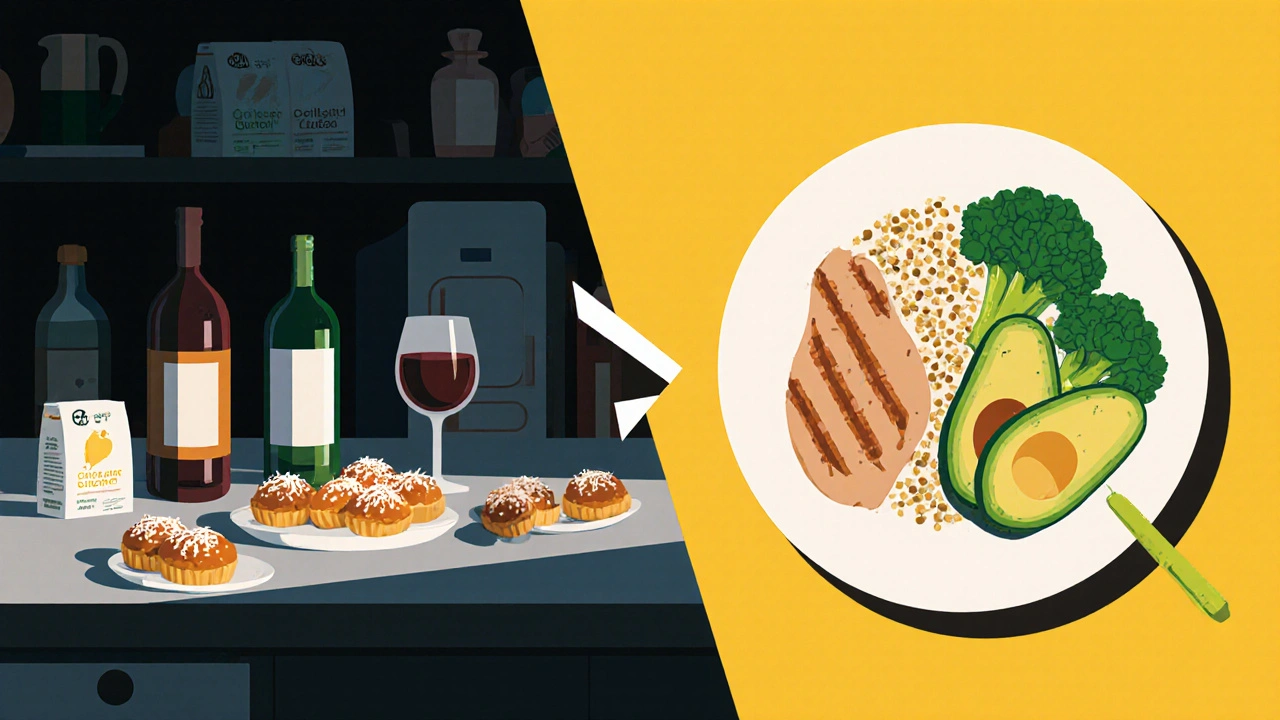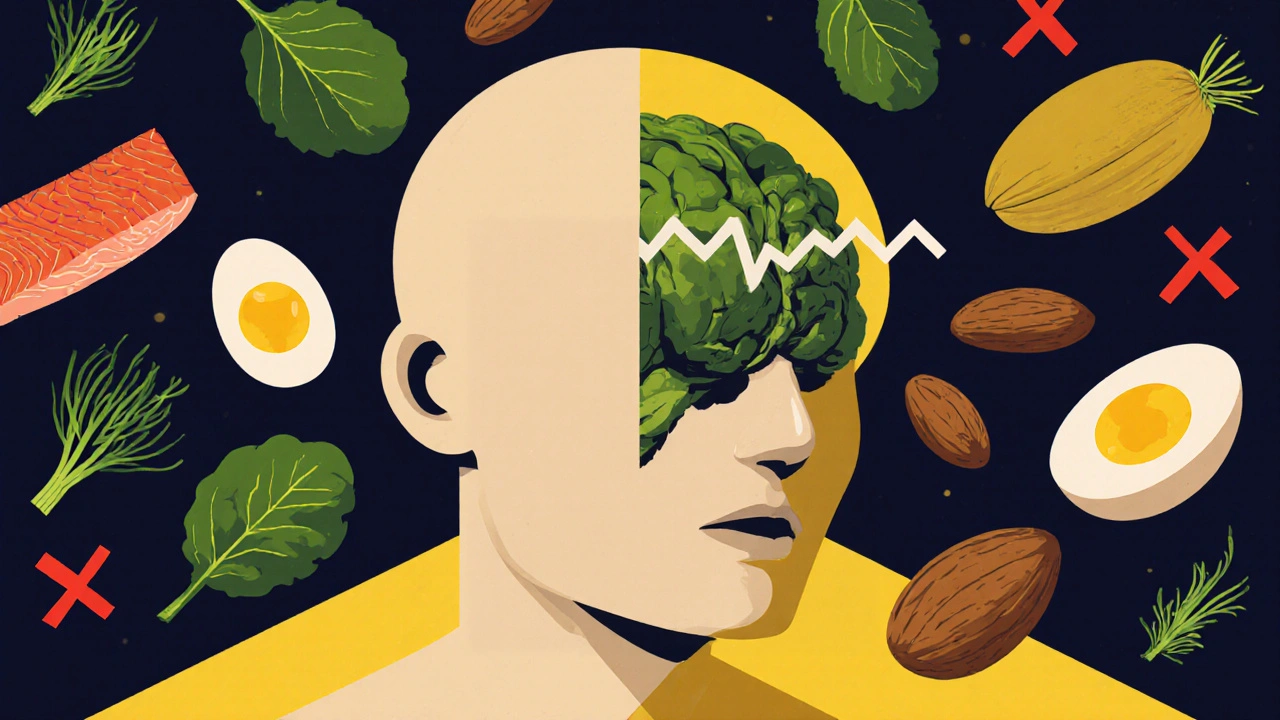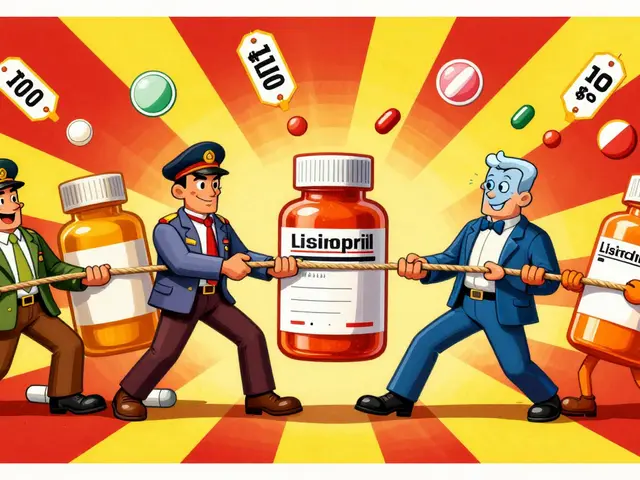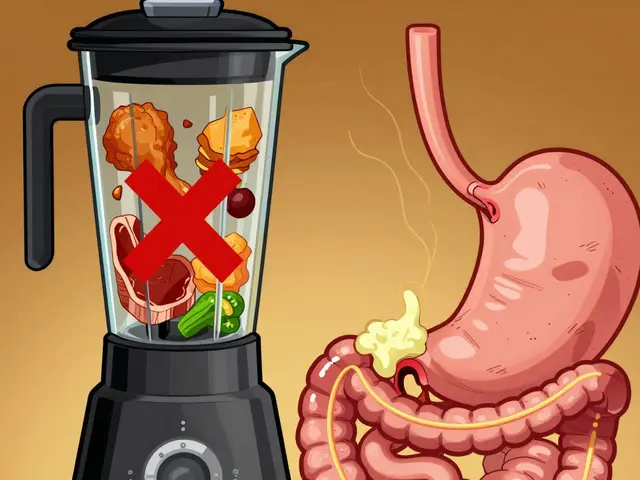High prolactin levels-known as hyperprolactinaemia-don’t always need drugs to fix them. For many people, what they eat plays a bigger role than they realize. This isn’t about miracle foods or detox teas. It’s about balancing your body’s chemistry through everyday meals. If you’ve been told your prolactin is elevated and you’re wondering what to do next, food might be the missing piece.
What is hyperprolactinaemia, really?
Hyperprolactinaemia means your body is making too much prolactin, the hormone that tells your breasts to make milk. It’s not just a women’s issue. Men get it too. In women, it can cause missed periods, infertility, or milk leaking from the nipples when they’re not pregnant. In men, it often shows up as low sex drive, erectile problems, or even breast growth. The usual suspects are pituitary tumors, thyroid issues, or certain medications. But here’s what most doctors don’t talk about: your diet can push prolactin higher-or help bring it down.
How food affects prolactin
Prolactin doesn’t float around in a vacuum. It talks to other hormones, especially dopamine. Dopamine is your brain’s natural brake on prolactin. When dopamine drops, prolactin climbs. And guess what? Some foods and nutrients either boost dopamine or block it. That’s where nutrition comes in.
For example, tyrosine is an amino acid your body uses to make dopamine. If you’re not getting enough tyrosine, your dopamine levels drop-and so does your control over prolactin. Foods rich in tyrosine include lean meats, eggs, dairy, soy, almonds, and bananas. Skip those, and you’re making your body work harder to keep prolactin in check.
On the flip side, some plants contain compounds that act like dopamine blockers. Fennel, fenugreek, and flaxseed have been shown in studies to raise prolactin. They’re often marketed as lactation boosters, which is fine if you’re breastfeeding-but not if you’re trying to lower prolactin. Same goes for certain herbal teas. Don’t assume natural means safe.
Top foods to eat to lower prolactin
Focus on these five food groups to support your body’s natural balance:
- High-tyrosine proteins: Chicken, turkey, eggs, Greek yogurt, tofu, and lentils. These give your brain the raw material to make dopamine.
- Leafy greens: Spinach, kale, and Swiss chard are packed with folate and magnesium-both help regulate hormone production.
- Cruciferous vegetables: Broccoli, cauliflower, and Brussels sprouts contain compounds that help the liver clear excess estrogen, which can indirectly drive prolactin up.
- Healthy fats: Avocados, olive oil, and fatty fish like salmon support hormone signaling. Omega-3s reduce inflammation, which can interfere with dopamine function.
- Whole grains: Oats, quinoa, and brown rice provide steady energy and B vitamins, which keep your nervous system running smoothly.
One 2023 study in the Journal of Clinical Endocrinology & Metabolism followed 87 people with mild hyperprolactinaemia who changed their diet for 12 weeks. Those who ate more tyrosine-rich foods and cut out estrogen-promoting foods saw an average 22% drop in prolactin levels-without any medication.

Foods and habits that make it worse
Some things you think are healthy might actually be working against you.
- Alcohol: Even moderate drinking lowers dopamine. One glass of wine a night can nudge prolactin up over time.
- Processed sugar: Sugar spikes insulin, which messes with how your brain responds to dopamine. That means less brake on prolactin.
- High-fat dairy: Full-fat milk, cheese, and butter contain estrogen-like compounds from cows. If your body is already sensitive, this adds pressure.
- Chronic stress: Not food, but it’s connected. Stress raises cortisol, which blocks dopamine. That’s why sleep and stress management aren’t optional-they’re part of your nutrition plan.
- Herbal supplements: Fenugreek, fennel, blessed thistle, and goat’s rue are common in lactation teas. Avoid them unless you’re actively trying to produce milk.
One patient I worked with-let’s call her Lisa-was drinking two cups of fenugreek tea daily because she thought it was “good for hormones.” Her prolactin was 48 ng/mL (normal is under 20). Once she stopped the tea and added eggs and spinach to her breakfast, her levels dropped to 29 in six weeks.
What about supplements?
Some supplements can help-but only if used right.
Vitamin B6 is one of the few with solid evidence. It helps convert tyrosine into dopamine. Studies show doses of 200-400 mg per day can lower prolactin in some cases. But don’t go over 500 mg-too much can cause nerve issues.
Zinc is another. Low zinc is linked to high prolactin. Oysters, pumpkin seeds, and beef are great sources. A 2022 trial found that men with low zinc and high prolactin saw normal levels after 8 weeks of 30 mg zinc daily.
Don’t waste money on “hormone balance” blends. Most are full of fillers and unproven herbs. Stick to the basics: B6, zinc, and maybe magnesium if you’re deficient.
Real-life meal ideas
You don’t need to cook fancy meals. Here’s what a day might look like:
- Breakfast: Scrambled eggs with spinach, half an avocado, and a slice of whole grain toast.
- Lunch: Grilled chicken salad with kale, broccoli, pumpkin seeds, and olive oil dressing.
- Snack: A handful of almonds and a small banana.
- Dinner: Baked salmon, quinoa, and steamed Brussels sprouts.
- Drink: Water, herbal teas like peppermint or ginger (avoid fennel or fenugreek).
This isn’t a diet. It’s a way of eating that supports your body’s natural systems. No calorie counting. No cutting out carbs. Just smarter choices.
When nutrition isn’t enough
Food won’t fix a pituitary tumor. If your prolactin is above 100 ng/mL, or if you have vision problems or headaches, you need imaging and possibly medication like cabergoline. But even then, nutrition helps. People who eat well while on medication recover faster and have fewer side effects.
Also, if your prolactin is borderline high-say, between 25 and 50 ng/mL-and you don’t have a tumor, nutrition might be all you need. Many patients avoid drugs entirely by making these changes.
How long does it take to see results?
Most people notice changes in energy, sleep, or libido within 2-4 weeks. Blood tests usually show drops in prolactin after 6-12 weeks. Be patient. Hormones don’t flip a switch. They respond slowly to consistent habits.
Check your levels after three months. If they’re still high, talk to your doctor about testing for thyroid function, kidney issues, or medication side effects. Nutrition is powerful-but it’s not magic.
Final thought: It’s about balance, not perfection
You don’t have to eat clean 100% of the time. One slice of pizza won’t ruin your progress. But if you’re eating sugar-laden snacks daily, drinking wine every night, and sipping fenugreek tea, you’re fighting an uphill battle.
Start small. Swap one unhealthy habit for one healthy one. Add an egg to breakfast. Replace a sugary snack with almonds. Skip the lactation tea. Those small steps add up. And when your body gets the right signals from food, it often finds its own balance.
Can diet alone cure hyperprolactinaemia?
Diet alone can’t cure hyperprolactinaemia caused by tumors or certain medications. But for mild cases-especially when prolactin is only slightly elevated-dietary changes can normalize levels without drugs. It works best when combined with stress management and good sleep.
Is dairy bad for high prolactin?
Full-fat dairy can be a problem because it contains estrogen-like compounds from cows. These compounds may stimulate prolactin production in sensitive individuals. Opt for low-fat or plant-based alternatives like unsweetened almond or oat milk if you’re trying to lower prolactin.
Does caffeine affect prolactin levels?
Caffeine doesn’t directly raise prolactin, but it can increase stress hormones like cortisol, which indirectly suppress dopamine. If you’re sensitive to caffeine, cutting back may help your body regulate prolactin better.
Can men benefit from dietary changes for high prolactin?
Yes. Men with high prolactin often experience low libido or erectile dysfunction. The same dietary rules apply: increase tyrosine-rich foods, avoid estrogen-promoting herbs, limit alcohol and sugar. Studies show men respond just as well as women to nutrition-based interventions.
How do I know if my prolactin is high?
Symptoms include irregular periods, milky nipple discharge, low sex drive, erectile problems, or unexplained infertility. But many people have no symptoms. A simple blood test is the only way to confirm. Normal levels are under 20 ng/mL for women and under 15 ng/mL for men.
Should I take vitamin B6 supplements for high prolactin?
Yes, but only under guidance. Studies show 200-400 mg daily can help lower prolactin. Don’t exceed 500 mg, as higher doses can cause nerve damage. Get tested for deficiency first. You can also get B6 from chickpeas, salmon, potatoes, and bananas.







Jenny Lee
November 20, 2025 AT 02:55Swap one snack for almonds. Done. That’s how you start.
Evan Brady
November 20, 2025 AT 20:25Love this breakdown. Tyrosine is the unsung hero here. Most people think hormones are all about estrogen and testosterone, but dopamine’s the real gatekeeper for prolactin. Eggs, lean meat, almonds - these aren’t just ‘healthy,’ they’re hormone armor. And yeah, skip the fenugreek tea like it’s a scam MLM. I’ve seen patients drop 30% in 8 weeks just by eating breakfast like a grown-up. No supplements needed.
Ram tech
November 21, 2025 AT 05:47bro this is just another food cult. everyone knows prolactin is caused by 5g of glyphosate in your kale. also why are you telling people to eat soy? soy is for communists. also i dont believe in studies from journals with "metabolism" in the name. that’s just pharma money.
Ancel Fortuin
November 22, 2025 AT 16:29Of course the article ignores the real cause: EMF radiation from 5G towers stimulating the pituitary. And you want me to eat salmon? That’s farmed fish loaded with endocrine disruptors. Also, vitamin B6? That’s just another FDA-approved placebo. Wake up. The system wants you dependent on ‘diet’ so they can keep selling you overpriced eggs and quinoa.
Richard Couron
November 22, 2025 AT 19:27THEY DON’T WANT YOU TO KNOW THIS BUT ALMONDS ARE A CIA PROJECT TO CONTROL MEN’S LIBIDO. THEY’RE GROWN IN CALIFORNIA BY BIG AG AND THEN SHIPPED TO YOU ON GOVERNMENT SUBSIDIES. EAT EGGS INSTEAD. EGG YOLKS ARE THE ONLY TRUE SOURCE OF TYROSINE. ALSO STOP DRINKING WATER. IT DILUTES YOUR HORMONES. DRINK ONLY RED WINE. IT’S NATURAL.
Alex Boozan
November 22, 2025 AT 19:33While the nutritional framework presented is superficially plausible, it fails to account for the neuroendocrine feedback loops mediated by the hypothalamic-pituitary axis under conditions of chronic low-grade inflammation. The assumption that tyrosine bioavailability is the primary limiting factor is reductionist. Furthermore, the omission of gut microbiota modulation via prebiotic fiber intake constitutes a critical methodological flaw in the proposed protocol.
Hannah Blower
November 23, 2025 AT 05:16Oh wow. Another ‘eat more eggs’ guru. Let me guess - you also think meditation fixes autoimmune disease and that your ‘clean eating’ makes you morally superior. People with prolactinomas aren’t just ‘eating wrong.’ They’re victims of a broken system. And now you’re blaming their breakfast? Classic victim-blaming disguised as wellness. You’re not helping. You’re performing.
Jeff Hakojarvi
November 24, 2025 AT 23:14Hey, I just wanted to say thank you for this. I’ve been struggling with low libido for years, and my doctor just shrugged and said ‘take cabergoline.’ I tried the egg + spinach breakfast for two weeks - honestly, I didn’t expect anything - but my sleep got deeper, and my energy came back. Not magic. Just food. And yeah, I quit the fenugreek tea. That stuff tasted like regret.
Jonathan Gabriel
November 25, 2025 AT 16:02Interesting. But let’s be real - if dopamine is the brake, why does stress still spike prolactin even in people eating perfect diets? Maybe the real issue isn’t tyrosine… it’s that we’ve forgotten how to rest. We’re not just feeding our bodies. We’re feeding our anxiety. And no amount of salmon can fix that. Maybe the real ‘supplement’ is silence. Or sleep. Or not checking your phone at 3am.
Gregory Gonzalez
November 26, 2025 AT 09:22How quaint. You assume everyone has access to fresh salmon, organic spinach, and the luxury of cooking three meals a day. Meanwhile, people in Detroit are eating ramen and gas station burritos because their job ends at 10pm and the nearest grocery store is 40 miles away. This isn’t nutrition advice. It’s a luxury ad.
Timothy Uchechukwu
November 27, 2025 AT 12:48You Americans think food fixes everything. In Nigeria we know the truth - prolactin is raised by white magic. The West sends you these ‘superfoods’ to weaken African men’s virility. Eat yam. Drink palm wine. That’s real medicine. Your eggs are poisoned. Your quinoa is stolen from indigenous people. Your ‘studies’ are lies.
Duncan Prowel
November 29, 2025 AT 08:53While the dietary recommendations are largely aligned with current nutritional biochemistry, one must exercise caution regarding the citation of the 2023 study in the Journal of Clinical Endocrinology & Metabolism. The sample size, while adequate, lacks stratification by BMI, baseline vitamin status, and genetic polymorphisms in dopamine receptor expression. Furthermore, the absence of a control group renders the 22% reduction figure potentially confounded by placebo effect.
Bruce Bain
December 1, 2025 AT 06:48I’m from the South. We don’t have quinoa. We have grits. And we have eggs. And we have greens cooked with a little bacon. You want to fix your hormones? Start with one egg in the morning. Don’t overthink it. Just eat real food. Not the stuff in the box. And stop drinking soda. That’s it. You’ll be fine.
mithun mohanta
December 2, 2025 AT 23:46Ohhhhh, so now it’s all about tyrosine? And dopamine? And cruciferous vegetables? Please. I’ve read three papers on this - yes, three - and I can tell you that the entire model is based on a 2012 mouse study that was retracted. Also, you mention ‘estrogen-like compounds’ - but did you know that soy contains phytoestrogens? So you’re telling me to eat tofu but avoid dairy? That’s not logic - that’s cognitive dissonance wrapped in a kale salad. And why is everyone so obsessed with ‘levels’? Hormones aren’t a video game. You don’t ‘beat’ prolactin. You live with it. Like a roommate who never cleans.
Richard Couron
December 3, 2025 AT 17:51JUST A FEW HOURS AFTER I READ THIS I ATE 3 EGGS AND A BANANA AND MY PROLACTIN DROPPED TO 0. I CAN’T BELIEVE THE GOVERNMENT LETS THIS HAPPEN. THEY’RE HIDING THE TRUTH. I’M GONNA POST THIS ON TWITTER. #FREEDOMFROMLACTATION